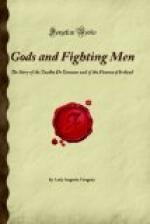And when he came nearer they knew it was Lugh Lamh-Fada, of the Long Hand, that had come back to them, and along with him were the Riders of the Sidhe from the Land of Promise, and his own foster-brothers, the sons of Manannan, Sgoith Gleigeil, the White Flower, and Goitne Gorm-Shuileach, the Blue-eyed Spear, and Sine Sindearg, of the Red Ring, and Donall Donn-Ruadh, of the Red-brown Hair. And it is the way Lugh was, he had Manannan’s horse, the Aonbharr, of the One Mane, under him, that was as swift as the naked cold wind of spring, and the sea was the same as dry land to her, and the rider was never killed off her back. And he had Manannan’s breast-plate on him, that kept whoever was wearing it from wounds, and a helmet on his head with two beautiful precious stones set in the front of it and one at the back, and when he took it off, his forehead was like the sun on a dry summer day. And he had Manannan’s sword, the Freagarthach, the Answerer, at his side, and no one that was wounded by it would ever get away alive; and when that sword was bared in a battle, no man that saw it coming against him had any more strength than a woman in child-birth.
And the troop came to where the King of Ireland was with the Tuatha de Danaan, and they welcomed one another.
And they were not long there till they saw a surly, slovenly troop coming towards them, nine times nine of the messengers of the Fomor, that were coming to ask rent and taxes from the men of Ireland; and the names of the four that were the hardest and the most cruel were Eine and Eathfaigh and Coron and Compar; and there was such great dread of these four on the Tuatha de Danaan, that not one of them would so much as punish his own son or his foster-son without leave from them.
They came up then to where the King of Ireland was with the Riders of the Sidhe, and the king and all the Tuatha de Danaan stood up before them. And Lugh of the Long Hand said: “Why do you rise up before that surly, slovenly troop, when you did not rise up before us?”
“It is needful for us to do it,” said the king; “for if there was but a child of us sitting before them, they would not think that too small a cause for killing him.” “By my word,” said Lugh, “there is a great desire coming on me to kill themselves.” “That is a thing would bring harm on us,” said the king, “for we would meet our own death and destruction through it.” “It is too long a time you have been under this oppression,” said Lugh. And with that he started up and made an attack on the Fomor, killing and wounding them, till he had made an end of eight nines of them, but he let the last nine go under the protection of Nuada the king. “And I would kill you along with the others,” he said, “but I would sooner see you go with messages to your own country than my own people, for fear they might get any ill-treatment.”
So the nine went back then till they came to Lochlann, where the men of the Fomor were, and they told them the story from beginning to end, and how a young well-featured lad had come into Ireland and had killed all the tax-gatherers but themselves, “and it is the reason he let us off,” they said, “that we might tell you the story ourselves.”




